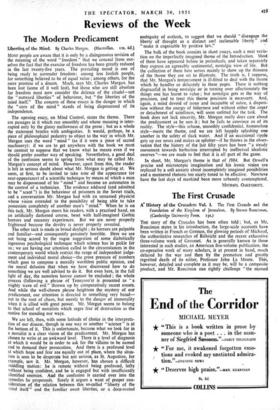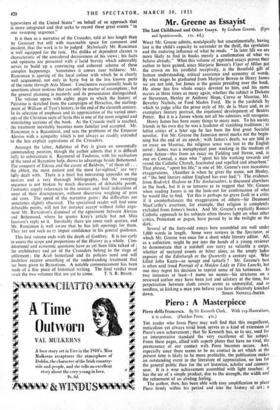The First Crusade
History of the Crusades: Vol. I. The First Crusade and the Foundation of the Kingdom of Jerusalem. By Steven Runciman. (Cambridge University Press. 25s.)
THE story of the Crusades has been often told ; but, as Mr. Runciman states in his introduction, the large-scale accounts have been written in French or German, the glowing periods of Michaud, the authoritative researches of Rohricht and the recent exhaustive three-volume work of Grousset. As is generally known to those interested in such studies, an American five-volume publication, the co-operative work of many scholars, is at present in hand, much delayed by the war and then by the premature and greatly regretted death of its editor, Professor John La Monte. This, however, detailed and complete as it may be, will be a composite product, and Mr. Runciman can rightly challenge " the massed typewriters of the United States " on behalf of an approach that is more integrated and that seeks to record these great events " in one sweeping sequence."
It is then as a narrative of the Crusades, told at less length than by Grousset but still with reasonable space for comment and incident, that the work is to be judged. Stylistically Mr. Runciman is well equipped for the task. His dislike of dependent clauses is characteristic of the considered decisiveness of his views ; his facts and opinions are presented with a lucid brevity which admirably serves to build up a convincing and coherent scheme of these complex happenings. Sometimes it comes near baldness: Mr. Ronciman is sparing of the local colour with which he is clearly well acquainted, not only in Syria but in the less known parts of the route through Asia Minor. Conciseness occasionally leads to assertions about motives that can only be matter of assumption ; but the general planning is masterly and its presentation distinguished.
The volume opens with eighty pages in which the history of Palestine is sketched from the campaigns of Heraclius, the starting- point of William of Tyre's history, to the end of the eleventh century. In its selection of emphasis and its appreciation of the varied inter- ests of the Christian sects of Syria this is one of the most original and stimulating sections of the book. As the Crusade itself is reached, the treatment inevitably becomes more familiar 'and accepted. Mr. Runciman is a Byzantinist, and sees the problems of the Emperor Alexius with a sympathy which is not always as readily extended to the less explicit aspirations of the Crusaders.
Amongst the latter, Adhdmar of Puy is given an unwontedly commanding position, though the author admits that it is difficult fully to substantiate it. Raymond of Toulouse, with his realisation of the need of Byzantine help, shows to advantage beside Bohemond. The conquest of Edessa and the career of Baldwin, "of them all ... the ablest, the most patient and the most far-sighted," are very fully dealt with. There is a brief but interesting appendix on the sources and a very thorough bibliography, but the sweeping sequence is not broken by much discussion of debatable point*. Footnotes supply references to the sources and brief indications of some of their discrepancies, without discursive weighing of pros Ind cons. The speed of the narrative gains ; the difficulties are sometimes slightly obscured. The specialised reader will find some Jebatable points, will not for instance accept' without fuller argu- ment Mr. Runcirnan's dismissal of the agreement between Alexius 2nd Bohemond, where he quotes Krey's article but not Miss laniison's reply to it. Inevitably there are some such queries, and Mr. Runciman is well aware that he has left openings for them. They are not such as Ps impair confidence in his general guidance.
This first volume ends with the death of Godfrey. It is too early to assess the scope and proportions of the History as a whole. Con- stitutional and economic questions have as yet been little talked of ; the architecture and art of the Crusaders belong to the stage of settlement ; the Arab hinterland and its policies need and will Joubtless receive something of the understanding treatment that 'las been given to Byzantium. A notable commencement has been made of a fine piece of historical writing. The final verdict must matt the two volumes that are yet to come. T. S. R. BOASE.































 Previous page
Previous page